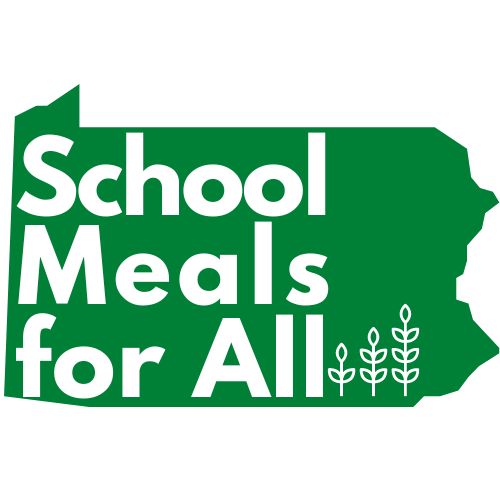Earlier this month, Governor Shapiro signed the General Appropriations bill, which includes funding to continue universal school breakfast for the 2023-2024 school year and includes funding to cover lunch costs for students who previously paid for reduced-price lunches – a first in Pennsylvania! This is a victory for kids and families in PA and one step closer to making universal school meals for all a reality in the Commonwealth.
One in eight children in Pennsylvania experiences food insecurity, which leads to a lifetime of negative health outcomes for children. Studies show that school meals play an important role in reducing childhood hunger, supporting good nutrition, and ensuring that students are well-nourished and ready to get the most out of their school day.
For the first two full school years of the pandemic, federal aid provided free breakfast and lunch for all public school students across the country, but those funds came with an expiration date. When those funds ended in September 2022, then Governor Tom Wolf extended free breakfast through the 2022-2023 school year. It allowed schools to serve even more students, ensuring they were well-nourished and better prepared to learn. According to the School Nutrition Association of PA (SNAPA), breakfast participation increased from 10% in 2018 to 34.4% currently and participation of free-eligible students increased by 16%.
“Continuing universal free school breakfast across Pennsylvania helps to ensure every student will start their day with a nutritious meal,” said Nicole Melia, Food & Nutrition Services Supervisor at Great Valley School District, and Public Policy and Legislative Chair for SNAPA, “funding school meals helps to strengthen child nutrition programs, addresses equity and stigmas around school breakfast so more children will have access to nutritious meals and sets our students up for success in the classroom.”
The National Farm to School Network (NFSN), in coordination with the National Healthy School Meals for All Coalition, is calling on Congress to permanently fund nationwide free school meals. In the meantime, many states have decided to take action on this issue now by proposing to extend the financial support to make school meals accessible and affordable for all, regardless of household income.
Here in Pennsylvania, State Representative Kinkead and State Senator Williams introduced companion bills HB180 and SB180 during the 2023 legislative session, which proposed creating the Universal School Meal Program and establishing the Universal School Meal Fund. Though fully funded school lunches for all were not included in Governor Shapiro’s budget, the funding for breakfasts and lunches for students previously on reduced-priced meals is momentum in the right direction.
“Knowing that students will head back into this school year able to start every day ready to learn with a healthy breakfast is a huge relief for families and schools,” said Senator Williams. “School meals are just as essential to learning as textbooks and pencils– students can’t learn when they’re hungry. I’m looking forward to the next steps, as we work to codify this cornerstone of food security for students, expand the program to ensure that every student has access to breakfast and lunch, and eliminate school meal debt.”
The movement to establish sustained and permanent funding for school meals aligns with the core components of “Farm to School” which ultimately aim to provide kids with enriching and nourishing experiences with food and agriculture by supporting thriving and resilient community food systems through school gardens, experiential learning, and serving locally-grown and produced food in school settings.
In addition to the benefits to students and families, funding school meals also has economic benefits. They provide jobs for food service professionals and support local farmers and food producers. They also have the potential to boost the economy by improving academic achievement and reducing healthcare costs associated with poor nutrition.
“Providing a daily, morning meal to all 1.7 million public school students in Pennsylvania is a fantastic use of taxpayer dollars,” said state Rep. Emily Kinkead, D-Allegheny. “While universal free school breakfast is a great step toward addressing child hunger, providing free lunch would make a much bigger dent in food insecurity, as many kids do not arrive at school in the early hours when breakfast is served.”
SNAPA led the coalition of groups who support School Meals for All in PA. Since launching the effort in the fall of 2022, removing the cost barrier of school meals has been supported by over 20 local and national organizations who recognize the positive impact that school meals have on future education and health outcomes for students in Pennsylvania.
“What we feed our children makes a huge difference,” said Melia, “It’s why there’s a diversity of voices speaking up. From food service directors to farmers and manufacturers and from parents to representatives of school districts. We all recognize that funding school meals goes beyond just the child but also supports the economic growth of our communities.”
To join the efforts to bring universal school meals to all kids in Pennsylvania, visit the campaign website at snapa.org/mealsforall or contact advocacy@snapa.org



